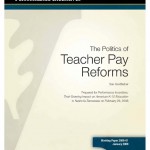The Politics of Teacher Pay Reform
 This paper explores the politics of various types of teacher compensation reforms, with a particular focus on pay for performance. It examines the political positions taken by the nations two teachers’ unions, the extent to which these reflect the preferences of teachers, and how both influence the decisions by localities to implement reforms. New Washington State survey data that describes teachers’ views on compensation is analyzed to contextualize teacher opinions and show variation based on both the type of teacher and the context in which a teacher works.
This paper explores the politics of various types of teacher compensation reforms, with a particular focus on pay for performance. It examines the political positions taken by the nations two teachers’ unions, the extent to which these reflect the preferences of teachers, and how both influence the decisions by localities to implement reforms. New Washington State survey data that describes teachers’ views on compensation is analyzed to contextualize teacher opinions and show variation based on both the type of teacher and the context in which a teacher works.
The role of local decision-makers (for instance, school boards and superintendents) and the incentives that drive their thinking about reform implementation is also examined, with a focus on the dynamics of local school district politics and the institutional inertia of public school systems. The paper concludes with a discussion of various logistical hurdles associated with pay reforms (such as data systems, comparison groups, methods of calculating teacher effectiveness, or confidence in effectiveness measures) and whether and how these can be overcome, and fleshes out what the forces shaping teacher compensation choices might portend for reform initiatives.
To read this paper, please click here.
Connect with Vanderbilt
©2024 Vanderbilt University ·
Site Development: University Web Communications